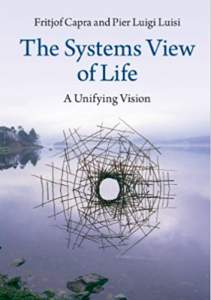The Systems View of Life: A Unifying Vision, Fritjof Capra & Pier Luigi Luisi
 The approach of systems thinking considers the deep complexity, interconnectedness and networks of life- non-living and living. System thinking in a sense is to explain what just is. Capra and Luisi eloquently put it: “The system is more than the sum of its parts”
The approach of systems thinking considers the deep complexity, interconnectedness and networks of life- non-living and living. System thinking in a sense is to explain what just is. Capra and Luisi eloquently put it: “The system is more than the sum of its parts”
The part of this book that resonates with me the most is the idea or concepts of hierarchies. Capra argues that in nature there is no such thing as hierarchies: “we can picture an ecosystem schematically as a network magnified, appears itself as a network. Each node in the new network may represent an organ, which in turn will appear as a network when magnified, and so on” (p. 68). Each node having as much value as the other. In contrast hierarchies prompt layers of larger systems to dominate smaller ones. This is a scheme and does not reflect nature. This similar to our political system or economic system of distributing wealth–few people in the system (the one percent) prioritizing their networks over others. This domination of positioning one system against another is without a doubt the value system of patriarchal language. It is a corrosive value to be in competition with one another’s systems; however, this has become so normalized in the modalities of politics and economics. Shifting to a paradigm of systems thinking challenges the balance of power and promotes an ecology of reciprocity. It encourages sharing, empathy, and cooperation. Again, these values challenge the dominant values of competition.